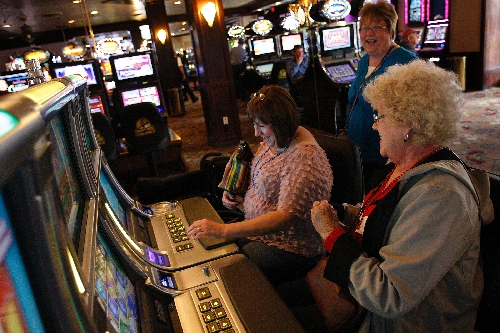Golden Gate’s face-lift includes new security system
Golden Gate co-owner Greg Stevens and his partners have taken advantage of the prolonged economic downturn to give the 105-year-old landmark a face-lift, repositioning the property as a boutique hotel on Fremont Street.
Their latest project, installing a high-definition surveillance system for the casino, took three months to complete and for state regulators to test before they were given approval to replace their outdated analog system.
The Golden Gate needed to be renovated long before Desert Rock Enterprises, co-owned by Stevens and his brother, Derek, purchased a majority position in 2008 from Mark Brandenburg. Brandenburg remains president of the property.
"It was a rough beginning. The economy didn't help us out over the last couple of years," said Stevens, adding the renovations put them in a better position to market their hotel and Fremont Street as an alternative destination to the Strip.
Over the last three years, the property has been busy with renovations, including upgrading the 15 table games and 270 slot machines on the casino floor, installing a new operating system in the casino and remodeling the 106 hotel rooms. A player tracking system, Club 1906, was added by the new owners.
In late 2009, Golden Gate opened the first permanent outside bar on Fremont Street. Stevens, who has an engineering background, said the success of One Bar, a slush and beer bar, has been driven by a geothermal system that allows them to serve cool drinks when outside temperatures hit 105 degrees.
"We've done a lot to the property. Really, we've kind of re-energized the hotel and Fremont Street after we installed the One Bar outside," he said. "We've got a lot of ideas. And some pretty big plans for the property."
Stevens declined to disclose the cost of the renovations.
The latest upgrade is a newly installed high-definition surveillance system, which replaces an outdated analog system.
"It provides us with four times the resolution of a typical camera," Stevens said. "It's a purely digital system. Meaning it's a simpler and less expensive system for us to operate."
It also creates a smaller footprint and consumes less power than the old analog system, he said.
The Nevada Gaming Control Board mandates no-loss recording at 30 frames per second, or the frequency at which an imaging device produces unique consecutive images called frames.
Stevens said IndigoVision's system met that mandate, allowing the casino to remove its standard-definition cameras.
"The clarity and detail that the HD cameras have delivered transforms our surveillance operation," he said. "However, one of the main reasons we chose IndigoVision's solution is the ability to deliver ... high-quality HD video with a guarantee of no lost frames under any circumstances."
The HD surveillance cameras allow the operators to clearly recognize individual faces and distinguish between card suits and chip values. Stevens said the system makes it easier to identify cheats and to resolve disputes.
He said the hotel installed HD cameras to monitor activity at the outdoor bar and will soon place them throughout the property.
When asked if the new system, which has been operational for about two weeks, had caught anyone cheating, Stevens laughed but declined to answer.
Contact reporter Chris Sieroty at
csieroty@reviewjournal.com or 702-477-3893.






















